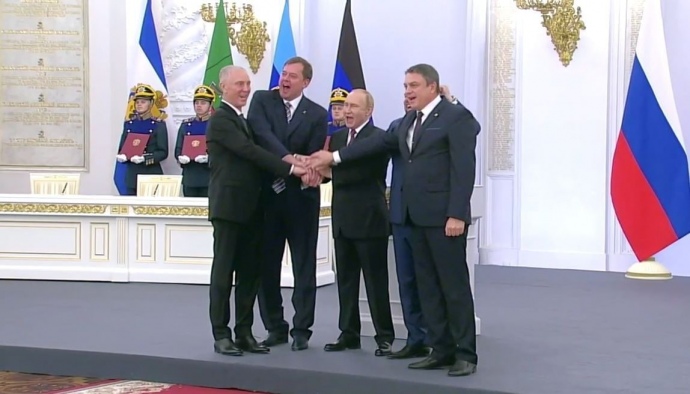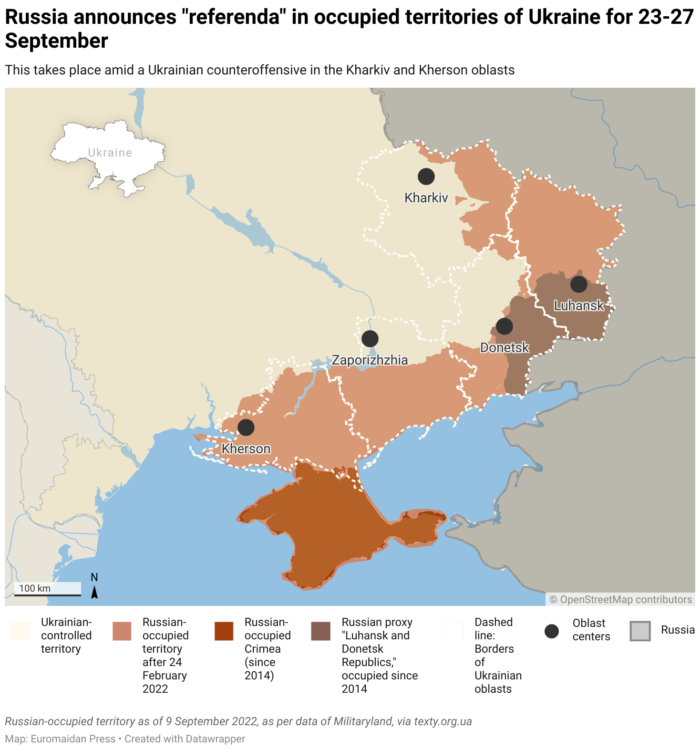Russian President Vladimir Putin formally approved the annexation of the occupied parts of Kherson, Zaporizhzhia, Donetsk, and Luhansk oblasts on 30 September 2022. Here are five things that this will change.
Propaganda shows termed “referendums” that concluded in the Russian-occupied territories on 27 September served as the legal pretext for yet another Russian landgrab. Predictably, Russia’s occupation authorities reported a surreally high turnout with an even more surreally high “approval rate” for being annexed by Russia. Then, Russian puppet “officials” of the occupied territories convened in Moscow where Putin proclaimed the “admission” of these occupied regions into Russia.

Why did these propaganda shows take place and what happens next?
Pseudo-referendum shows have no legitimacy
Russia had discussed plans for conducting “referendums” ad nauseam since its occupation of Ukraine’s southeastern regions in March 2022. However, the plans habitually got postponed due to local resistance and a strong partisan movement that announced a safari on local collaborators participating in preparing the pseudo-referendums.
These happenings, termed “propaganda shows” by Ukraine’s Foreign Minister Dmytro Kuleba, are legally void disregarding their absurd organization — with “voting” teams barging into people’s homes, accompanied by armed soldiers, and offering zero voting privacy.
Ukrainians living in the occupied territory were literally forced to choose between compromising their safety or following their conscience. According to Vira Yastrebova, CEO of the East Human Rights group, residents who were not successful in avoiding contacting the “voting” teams and either refused to take part or voted “no” were detained. Not all of those who were detained had returned or gotten in contact with their family.
According to Harald Hartvig Jepsen, International Senior Adviser of the International Foundation for Electoral Systems Ukraine, only Ukraine can hold a referendum on Ukrainian territory, and by organizing fake voting on the territory it occupies, Russia has violated a range of international standards.
“In particular, the 1945 UN Charter co-signed by Russia forbids the use of force against the territorial integrity or independence of another state. The 1949 Geneva Convention (IV) and 1958 authoritative comments state that an occupying power cannot change the status or annex territory of another state when hostilities are ongoing and that a decision on the status of occupied territories can be settled only as a result of peace negotiation after hostilities have ended. Therefore, the results of the current pseudo-referendums on the status of occupied territories of Ukraine are illegitimate and bear no legal consequences,” Ukraine’s election watchdog Opora notes.

Ukraine’s partners condemned both the pseudo-referendum shows and Russia’s subsequent annexation of the regions. US President Biden said that the US “will always honor Ukraine’s internationally recognized borders” and would “continue to support Ukraine’s efforts to regain control of its territory by strengthening its hand militarily and diplomatically.” The EU stated that it “firmly reject[s] and unequivocally condemn[s] the illegal annexation,” and NATO Secretary General Stoltenberg said that NATO Allies “will not[] recognize any of this territory as part of Russia.”
Ukrainian President Zelenskyy had stressed that in the annexation, Russia will not “receive new Ukrainian territory,” but will instead “append itself to the catastrophe that it brought to the occupied territory” of Ukraine, as Russia’s annexation of Ukrainian territory would “kill the remainder of normal statehood still preserved in Russia,” and that the road to negotiating with Putin would be closed.
Tellingly, shortly after the annexation ceremony in Moscow, Zelenskyy announced that Ukraine is submitting an application for fast-track NATO membership and reiterated that negotiations are no longer possible with Putin. He stressed that Ukraine is “ready for a dialogue with Russia, but already with another president of Russia” as reaching an agreement on coexistence on equal, honest, decent, and fair terms “is impossible with this Russian president.”
Meanwhile, the Ukrainian army continues to advance in Kharkiv Oblast, where Ukraine regained swaths of land in a surprise offensive in early September, paying no heed to the sham “referendums” or annexation ceremonies. On 30 September, Operational Command East announced they had almost encircled a Russian grouping in the key city of Lyman.
As well, the Blue-Yellow partisan movement announced that despite the annexation, they will continue working to deoccupy their homeland.
Why did Russia annex the occupied Ukrainian territories after pseudo-referenda shows?
Because the world swallowed the occupation of Crimea. Globally speaking, Russia was able to hold off this show because of the world’s weak reaction to Russia’s annexation of Crimea in 2014 and the conduction of pseud0-referenda on the “independence” of the territories it occupied in Donbas, as well as the occupation of parts of Georgia in 2008. Had the aggressor received the proper rebuttal at the onset, Russia would not have been able to expand its military presence in occupied Crimea and the “Luhansk and Donetsk People’s Republics” and launch this full-blown invasion of Ukraine. As evil was not punished then, it grew.
Because it needed a distraction from Russia’s military losses. Viewed from the perspective of Russia’s ongoing war against Ukraine, the abrupt pseudo-referendum shows, which were announced a mere two days before their start on 21 September, serve Putin’s domestic propaganda needs. They offer a welcome distraction from Ukraine’s unexpected counteroffensive in Kharkiv Oblast, where in the course of five days, Ukraine liberated more land than Russia gained since April 2022. This turn of events was extremely demoralizing for the Russian population, most of which supports the war against Ukraine, so the pseudo-referendum shows will appear to present at least some kind of “victory” to Putin’s electorate. And a morale boost is something that Putin needs to give Russia amid a mobilization that has sent at least 200,000 Russians fleeing into the near abroad.
Ukraine’s counteroffensive near Kharkiv: what enabled the Balakliia blitzkrieg
Because this allows the Kremlin to escalate its nuclear blackmail. From the onset, Russia’s preparation for the pseudo-referendum shows has been laden with escalatory rhetoric hinting at nuclear use for “self-defense” of “Russian territory,” as announced by Putin’s ally, Russian NSDC secretary Dmitry Medvedev. On the last day of the pseudo-referendum shows, Medvedev wrote that in case Russia will not hesitate to use nuclear weapons against Ukraine if it feels threatened and expressed hope that Western countries will have enough “common sense and desire for self-preservation” not to respond to this.
Although the west so far thinks Putin is unlikely to go nuclear, scenarios are being prepared, with mentions of the US having to get “fully involved.” Palpable fears of nuclear war are in the air, as shown by the last press conference of NATO Secretary General Jens Stoltenberg, where journalists asked questions suggesting Ukraine should “stay away” from deoccupying the annexed regions in order to “not provoke” Moscow’s nuclear escalation.
Mobilization and “referenda”: Russia escalates the confrontation with the West
Because Russia is trying to freeze the conflict. According to military strategist Lawrence Freedman, the Kremlin’s main aim with the pseudo-referendum shows is to stabilize the front in order to try to drag out the conflict, in which case, according to the Kremlin’s calculations, the West will give in after six months of a draw on the battlefield. So Russia is attempting to intimidate the West at all costs, including underwater explosions on the Nord Stream pipelines, Freedman writes.
What Russia’s formal annexation of Ukrainian lands will change
Ukraine will need to prepare for Russian nuclear escalation. Russia’s “annexation” will not stop the Ukrainian ongoing offensive. However, Ukrainian intelligence already assesses the possibility that Russia will use a tactical nuclear weapon as “very high.” Serhiy Danylov, deputy director of the Ukrainian Center for Middle East studies, concurs: he believes that Russia’s sham “referendums” are only a formal pretext for the next stage of escalation in the war, where Ukraine must prepare for a scenario in which Russia could use nuclear weapons.
The population of the occupied regions will feel more pressure to accept Russian passports and comply with Russian demands. Already now the occupying authorities are threatening to deport and fire Ukrainians who refuse to exchange their Ukrainian passports for Russian ones. As well, institutions that resist integration into the Russian system, like hospitals, will feel increasing pressure, Danylov says.
As well, their mobility will be limited: according to Andriy Orlov, director of the Center for Strategic Development of Territories in Melitopol (currently occupied by Russia), starting from 1 October, a special permit will be required from Ukrainians living in the occupied territories to leave them. “These people — women, children, the elderly — will become hostages, perhaps they will be used as a live shield,” the expert noted.
Overall, the residents of the occupied regions will be faced with a difficult decision: to accept the changes or resist. Many Ukrainians will despair, as it will be difficult to forecast the future of the region and whether Ukraine will liberate these lands soon.
Russia will escalate the Russification of these regions. As it did in occupied Crimea and Donbas, it will drive out the Ukrainian laws, currency, language, culture, and education.
Russia will try to mobilize men in the newly-annexed territories. In the territories of eastern Ukraine that were occupied since 2014, Russia had already forcibly mobilized 100,000 men, at least one-fourth of whom were killed after being sent to the front as cannon fodder. For this reason, Ukrainian authorities had urged Ukrainian men living in newly-occupied territories to leave immediately to avoid conscription. Oleksandr Samoilenko, head of the Kherson Oblast Council, shared that Russians already banned Ukrainian men from leaving occupied Kherson Oblast, and the chief quisling of the region had announced a mobilization of medical personnel.
The West could accelerate supplies of weapons. According to political scientist Andreas Umland, Russia’s current annexation will undermine Russia’s image in countries where people thought that Crimea was asking to be annexed in 2014 — for instance, Germany. “In these [new] areas, it is much less convincing, and therefore this new expansion of Russia, it undermines the image that still remains, perhaps abroad, in countries such as Germany,” he explained, adding that he hoped that apart from sanctions, the west will increase military aid to Ukraine.




